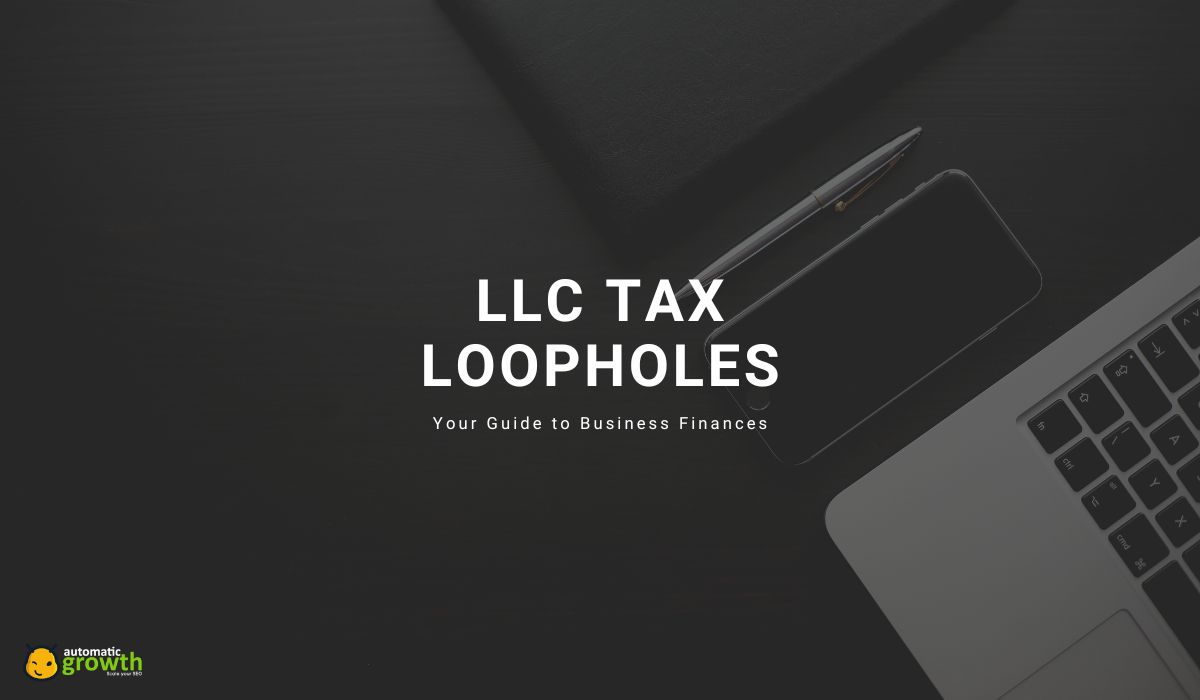Navigating the world of business taxes can be daunting, but with the right knowledge and strategies, your Limited Liability Company (LLC) can benefit significantly. In this guide, we delve into the intricacies of LLC tax loopholes, uncovering lesser-known loopholes and techniques that can lead to substantial tax savings.
Understanding an LLC
An LLC, or Limited Liability Company, is a flexible form of business structure that combines elements of both corporations and partnerships. It provides its owners, known as members, with limited liability protection, meaning their personal assets are typically protected from business debts and lawsuits.
LLCs are popular due to their simplicity, flexibility in management and operation, and favorable tax treatments. They can be owned by one or more individuals or entities and have the option to be taxed as a sole proprietorship, partnership, or corporation, depending on the number of members and elections made for tax purposes. This structure is often chosen for its balance of legal protections and operational flexibility.
Fast Facts
“Depending on the state, LLCs may benefit from lower state taxes compared to corporations.”
Tax Benefits of an LLC
Expanding on the tax benefits of Limited Liability Companies (LLCs), these entities offer a range of advantages that cater to different business needs:
Pass-Through Taxation
A key benefit of LLCs is pass-through taxation. This means that the company itself doesn't pay taxes on its profits. Instead, the profits and losses are passed through to the individual members' tax returns. Consequently, this avoids the issue of double taxation, where a corporation pays taxes at the business level, and shareholders pay taxes on dividends.
Tax Flexibility
LLCs provide significant flexibility in how they are taxed. They can default to be taxed as a sole proprietorship (single-member LLC) or partnership (multi-member LLC), or they can elect to be taxed as an S-corporation or C-corporation. This choice allows LLC owners to select the tax structure that best suits their financial situation and business goals.
Deductible Business Expenses
LLC members can typically deduct business expenses, including costs related to the operation, maintenance, and development of the business. These deductions can encompass a wide range of expenses, from office supplies and equipment to business travel, thereby reducing the overall taxable income.
Self-Employment Tax Advantages
For LLCs taxed as pass-through entities, members pay self-employment taxes on their earnings. However, if an LLC elects S-corporation tax status, members can be classified as employees and receive a salary, with the remaining income distributed as dividends. These dividends are not subject to self-employment taxes, potentially leading to substantial tax savings.
No Ownership Restrictions
LLCs are not subject to the ownership restrictions that apply to S-corporations. They can have an unlimited number of members, and there are no restrictions on the type of entities that can be members, including individuals, corporations, or even other LLCs and foreign entities.
Flexible Profit Distribution
LLCs offer the flexibility to distribute profits in a manner not directly tied to ownership percentages. This allows members to allocate profits and losses in a way that may be more favorable for tax purposes.
Fewer State Taxes and Regulations
Depending on the state, LLCs may benefit from lower state taxes compared to corporations. Additionally, LLCs often face fewer state-imposed regulations and administrative requirements, which can simplify operations and reduce compliance costs.
Estate Planning Benefits
LLCs can be effective tools for estate planning. Ownership interests in an LLC can be easily transferred to family members or into trusts, often without triggering significant tax consequences. This makes LLCs a popular choice for family-owned businesses and long-term asset management.
Avoidance of Corporate Formalities
Unlike corporations, LLCs are not required to hold annual meetings, maintain minutes, or adhere to many of the formalities that corporations must follow. This can lead to savings in both time and administrative costs.
Creditor Protection
In many states, LLCs offer enhanced protection against creditors. In such cases, a creditor who wins a lawsuit against the LLC may only obtain a charging order against distributions made to the indebted member, not the member's interest in the LLC itself.
The number of LLCs varies significantly by state, with states like Delaware and Wyoming being particularly popular due to favorable legal environments. For instance, as of 2021, there were over 1.4 million business entities registered in Delaware, many of which are LLCs. [1]
Fast Facts
“LLCs can establish HRAs to reimburse medical expenses tax-free. This can be a significant tax advantage, especially for LLCs with few employees.”
Exploring 5 LLC Tax Loopholes
LLC tax loopholes refer to legal strategies that owners of Limited Liability Companies (LLCs) can use to minimize their tax liabilities. While the term "loophole" might imply questionable practices, these strategies are typically legitimate ways of taking full advantage of the tax code. Here are some common LLC tax loopholes or strategies:
1. Choosing the Right Tax Classification
LLCs can choose how they are taxed (as a sole proprietorship, partnership, or corporation). This flexibility allows LLCs to select the most tax-efficient status. For example, electing S-corporation taxation can save on self-employment taxes.
2. Accelerated Depreciation
LLCs can take advantage of accelerated depreciation methods for their assets. This means they can write off the cost of business equipment and other tangible assets faster than the actual life of the asset, leading to larger deductions in the early years.
3. Real Estate Advantages
Real estate LLCs can benefit from tax breaks, such as the 1031 exchange, which allows the deferral of capital gains taxes when a property is sold and the proceeds are reinvested in a like-kind property.
4. Self-Rental Loophole
If an LLC owns property that it rents to a business owned by the same individuals, it can shift income and create tax deductions. Rent paid by the business is tax-deductible, while the rental income received by the LLC might be taxed at a lower rate.
5. Retirement Contributions
LLC members can set up self-employed retirement plans like SEP IRAs or Solo 401(k)s, allowing them to contribute pre-tax dollars and reduce their taxable income.
6. Health Reimbursement Arrangements (HRAs)
LLCs can establish HRAs to reimburse medical expenses tax-free. This can be a significant tax advantage, especially for LLCs with few employees.
7. Deducting Business Expenses
LLCs can deduct legitimate business expenses, such as office supplies, travel, and equipment. By accurately tracking and deducting these expenses, LLCs can significantly reduce their taxable income.
8. Fringe Benefits
Certain fringe benefits can be offered to employees (including member-employees in the case of an LLC taxed as a corporation) on a tax-free basis, such as health insurance, which can be a tax-efficient way to remunerate members or employees.
9. Hiring Family Members
Employing family members allows the shifting of income from higher tax brackets to lower ones. This can also enable the family member to qualify for tax-favored retirement plans or educational assistance programs.
It’s important to note that tax laws are complex and subject to change. What may be a legal and beneficial strategy one year could be less advantageous or even non-compliant the next. LLC owners should consult with tax professionals to ensure they are making the most of available tax strategies while remaining compliant with current tax laws.
















